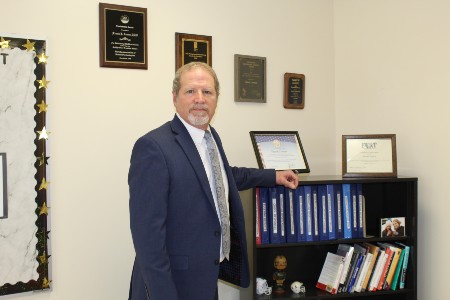MDCPS Student Services Department Tapped to Provide Crisis Response After Uvalde Incident
In the horrific aftermath of the mass shooting at Robb Elementary in Uvalde, Tx. on May 24, where 19 young students and two educators were fatally shot by a disgruntled former student, one of the crisis responders tapped to help in dealing with the trauma of such a crisis was Frank Zenere. Zenere is a school psychologist and district coordinator of the Student Services/Crisis Management Program at Miami-Dade County Public Schools.
 Frank Zenere, school psychologist and district coordinator of the Student Services/Crisis Management Program at Miami-Dade County Public Schools.“The support provided to students and staff by a crisis counselor during a traumatic incident is an integral part of reducing long term emotional trauma,” said Miami Dade Schools Police Chief Edwin Lopez.
Frank Zenere, school psychologist and district coordinator of the Student Services/Crisis Management Program at Miami-Dade County Public Schools.“The support provided to students and staff by a crisis counselor during a traumatic incident is an integral part of reducing long term emotional trauma,” said Miami Dade Schools Police Chief Edwin Lopez.
The National Organization for Victim Assistance tapped Zenere to lead the team of seven mental health specialists deployed to help parents, students, staff and the community of the town to deal with the debilitating aftermath of the tragedy in Uvalde.
In his 30 years of crisis management, Zenere has made it his mission to bring comfort and understanding to those experiencing loss and to help them navigate the grieving process. He was called to help after the September 11 terrorist attack in New York City, the Pulse Night Club shooting in Orlando, Fla., and most recently the collapse of the Champlain Tower in Surfside, Fla.
“He just has a very calm, knowledgeable professional presence,” said Dr. Mary Claire Mucenic, who was a member of the crisis response team at Broward County Public Schools in the aftermath of the Marjorie Stoneman Douglas High School mass shooting in 2018. “He was wonderful to have in a crisis situation with many of years of experience, which was helpful.”
Uvalde is the seventh school shooting he has responded to. Zenere met with parents and siblings of the deceased students, as well as surviving children from the classrooms where the shooting occurred, and other members of the community. In total, Zenere and his team met with more than 800 individuals and 250 families.
“We gave them an opportunity to tell their stories, to vent and validate their reactions,” said Zenere. “We help them to predict and prepare for what lies ahead.”
Zenere said one moment stuck with him long after he left Uvalde. A young boy who survived the shooting walked up to his father after the tragic event that day and asked him a heartfelt question, “Papi, you were supposed to protect me. “Where were you?”
He said another girl who witnessed the violence could not sit still, was fidgety and distracted and refused to leave her home or even go outside to play even 10 days after the incident.
Zenere also met with officials from the Uvalde Independent School District and introduced them to an overview of a curriculum, which addresses trauma in the schools, and how teachers and staff can help students to cope with the tragedy.
“We showed them strategies teachers can use in the classroom to talk and help their staff in getting ready to help the children,” said Zenere. “Even students who did not see the violence directly are still traumatized by police, helicopters.”
He said most difficult part of these missions is the loss of these children, who they were and who they would have become, as well as the loss of educators who gave their lives to protect these students.
“I left a piece of my heart in Uvalde,” said Zenere. “I pray that no other community will have to face the heartache experienced by the good people of this small Texas community and many other communities across our nation.”


